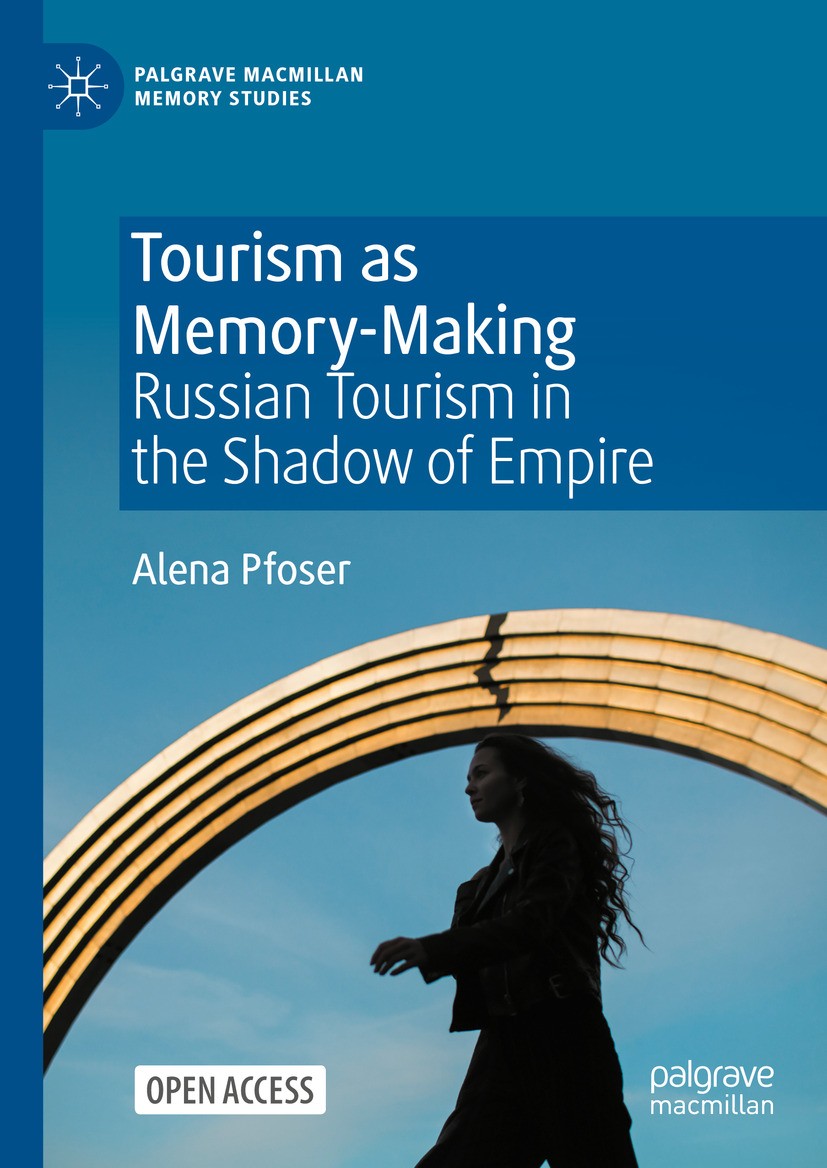
Tourism as Memory-Making: Russian Tourism in the Shadow of Empire: new book by Alena Pfoser
CRCC member Alena Pfoser has recently published a book entitled “Tourism as Memory-Making: Russian Tourism in the Shadow of Empire” in Palgrave Macmillan’s Memory Studies Series. This Open Access book provides the first investigation of the cultural politics of Russian tourism to cities that used to be part of the Soviet Union and the Russian empire and are now located in the independent nation-states neighbouring Russia. Until recently these cities used to be among Russians favourite destinations –because of their geographical proximity as well as personal and family connections and a general cultural familiarity due to a shared history and set of cultural references. At the same time, the political, economic and social changes since the break-up of the Soviet Union have unsettled Russians’ relations to these places that once were considered part of their own land. Histories of repression, deportations and other forms of political violence have publicly resurfaced. The material heritage has been reshaped to emphasise national victimhood alongside the ancient roots of the nation and new national heroes. Moreover, cities have been integrated into global tourism markets, expanding their visitor base to tourists from other parts of the world.
The book explores these post-imperial tensions through a focus on the production and contestation of cultural memories in guided city tours and in tourists’ perceptions. It asks: What cultural memories are co-produced in direct encounters between tour guides and tourists? How do Russian tourists relate to destinations through their memory practices? What consequences does memory-making in tourism has for identities and international relations in the post-Soviet region? The book is based on comparative ethnographic research in three cities, Tallinn, Kyiv and Almaty in summer 2019 and additional interview research in 2020 and 2021. Funded by an ESRC New Investigator Grant (2019-2022), Alena and her project team mapped the tourism offer in these cities, observed guided walking tours, spoke to tour guides and tourism managers and interviewed tourists.
The book also uses the case of Russian tourism to develop a new conceptual approach for studying tourism memories. Despite the significance of tourism for producing cultural memories, tourism has been largely disregarded within the field of memory studies. The limited consideration of tourism in memory scholarship is not only reflected in the number of contributions on the topic but also in a thematic and conceptual limitation of existing work. Specifically, a narrow focus on (difficult) heritage sites, ‘commodification anxiety’ (Macdonald, 2013) and a conception of tourists as either consumers or learners has limited the area of inquiry. Against this backdrop, this book provides a novel conceptual framework for memory-making in tourism based on four propositions: 1) an emphasis on memory-making as a process, 2) a transnational approach that situates memory-making in a wider political context, 3) a consideration of the diverse cultural forms that memory-making takes, 4) a focus on the (geo)political implications of memory-making in tourism.
Based on the analysis of guided walking tours and tourist interviews, the book provides a detailed analysis of three modes of remembering that it identifies as dominant ways of relating to the past in Russian tourism: imperial nostalgia, the production and consumption of national pasts and memory diplomacy.
While there was no nostalgia industry targeting Russian tourists in any of the cities, tour guides regularly buttressed nostalgia by mobilising shared cultural frameworks and histories. For many tourists encounters with post-Soviet cities and their heritage stimulated nostalgic reflections, even though the book reveals significant differences and ways of relating to locals in tourists’ nostalgic memories. Alongside imperial nostalgia, national(ised) pasts – in the form of ancient and medieval heritage, culinary heritage and more recent post-Soviet pasts – also play an important role in Russian tourism. In contrast to antagonistic national memories that have marked a difference to Russia and the Soviet pasts, national pasts in tourism are largely removed of contentious issues, focusing on distant pasts or on positive moments such as diversity and progress, to make them easily palatable for tourists. Finally, the book also discusses how tour guides and tourists relate to difficult pasts that have been the subject of memory conflicts. These topics are usually difficult to talk about but the book also shows that walking tours can also generate dialogue and exchange, opening up entrenched versions of the pasts.
Overall, the book makes the case for taking tourism seriously as it provides important insights into the production of cultural memories today. The book also adds a novel angle in the study of memory politics in the post-Soviet region, focusing on mundane and direct encounters between people and provides important insights into the diversity of post-imperial remembering in Russia that continue to matter today.